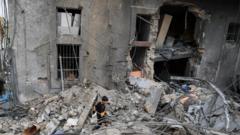The Israeli air force faces internal dissent as hundreds of reservists urge the government to negotiate with Hamas for hostages' return, fearing continued conflict risks lives. This critique reveals a stark divide within military ranks, prompting government backlash and implications for military operations.
Growing Dissent Within Israeli Air Force Over Gaza Strategy

Growing Dissent Within Israeli Air Force Over Gaza Strategy
A wave of criticism from air force reservists and retirees calls for peace negotiations with Hamas to secure hostage release amid ongoing war.
Hundreds of Israeli air force reservists and retired military officers have publicly urged the Israeli government to negotiate a deal with Hamas for the return of hostages, advocating for an end to the ongoing war in Gaza. This statement, signed by nearly a thousand individuals, including a former chief of staff, highlights a rift in the Israeli military regarding the management of the conflict.
The Israeli air force has been pivotal in the assault on Gaza, conducting airstrikes that have resulted in significant destruction and loss of life. The dissenting letter, however, was met with sharp criticism from the Israeli prime minister's office, which condemned the actions of the signatories as detrimental to the Israel Defense Forces (IDF) and advantageous to their adversaries. In a retaliatory move, the military announced the discharge of active reservists who endorsed the letter, although it's uncertain how many will be affected or the possible repercussions on military operations.
This surge of opposition from air force members is unprecedented, particularly considering the historical reluctance of this branch to confront governmental decisions. Last year, air force pilots expressed their dissent during protests against controversial government reforms aimed at diminishing judicial oversight—a movement paused during the October 2023 Hamas-initiated attacks on Israel.
The appeal for a cessation of hostilities emphasizes that the ongoing conflict only serves political wants rather than legitimate security needs, stressing the urgency to secure the hostages’ release. Accusations have surfaced alleging that Prime Minister Benjamin Netanyahu's motivations for prolonging the war are more politically driven than humanitarian. Critics assert that his coalition’s far-right factions threaten to destabilize his government if he capitulates before a perceived defeat of Hamas.
Retired Major General Nimrod Sheffer articulated the moral imperative behind the letter, asserting that the wellbeing of the remaining 59 hostages—24 of whom are believed to be alive—must take precedence. “It is immoral to abandon 59 hostages in Gaza,” he stated, urging those in power to ensure their safe return. “Silence is no longer an option.”
This development suggests an evolving dynamic within the Israeli military landscape that may challenge the government’s ongoing military strategies and the broader implications for peace in the region.





















